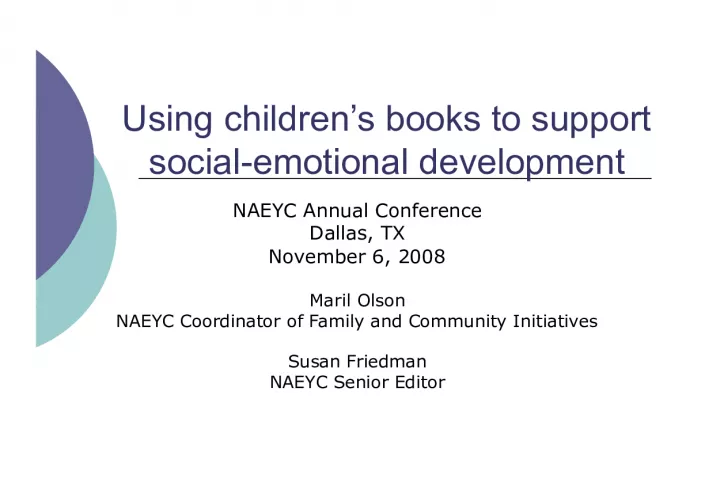Enhancing Social Emotional Development through Children's Literature.


Learn how children's books can aid in building emotional and social intelligence. Find out the different types of literature, know their benefits, and explore specific titles that promote emotional development. Gain insights to include more social emotional learning in daily activities.
- Uploaded on | 5 Views
-
 domenique
domenique
About Enhancing Social Emotional Development through Children's Literature.
PowerPoint presentation about 'Enhancing Social Emotional Development through Children's Literature.'. This presentation describes the topic on Learn how children's books can aid in building emotional and social intelligence. Find out the different types of literature, know their benefits, and explore specific titles that promote emotional development. Gain insights to include more social emotional learning in daily activities.. The key topics included in this slideshow are . Download this presentation absolutely free.
Presentation Transcript
1. Using children’s books to support social-emotional development NAEYC Annual Conference Dallas, TX November 6, 2008 Maril Olson NAEYC Coordinator of Family and Community Initiatives Susan Friedman NAEYC Senior Editor
2. Session Outcomes Understand how children’s literature can help support healthy social-emotional development Recognize different kinds of literature and describe their benefits Learn about specific titles that support social-emotional development Obtain ideas for embedding social- emotional content of books into daily activities
3. Why children’s books? Children need intentional support for social- emotional development: friendship skills, emotional literacy, empathy, impulse control, problem solving Children need support to cope with a range of challenges: broken toys, friend won’t share, new sibling, sibling rivalry, moving, unemployment, deployment, incarceration, divorce, death Helps children acquire new skills/concepts; become fluent in using new skills; maintain without prompting from adult; generalize to different settings/people/situations Easy and fun way to be more intentional about supporting social-emotional development
4. Social-emotional books Written explicitly about feelings/behaviors Build feeling vocabularies and/or provide information about behavioral expectations Direct, instructional format
5. Authentic children’s literature… Tells a good story in its own right; well- crafted Addresses challenging issues within a storyline: Directly as part of the storyline Indirectly by including coping/problem solving as part of the broader story Real-life situations Engages more than books that focus on specific situations in a direct, instructional format
6. Children’s literature… Helps children better understand life experiences Provides insights into human behaviors, emotions, dilemmas Stimulates curiosity Develops problem-solving skills Informs with facts, concepts, new understanding, demystifies Provides comfort Models coping strategies by walking readers through possible solutions or ways to cope
7. Using literature in the classroom… Be sensitive to circumstances and personalities Open communication between home and school helps create safety needed to take emotional risks Introduce sensitive issues/content beforehand Provide opportunities for responding to books – orally, through art, writing, movement, etc. Honor children’s unique response to books Read the same book for several days to provide more opportunities for children to talk about the story, predict what will come next, learn new vocabulary, talk about own experiences Use to embed social-emotional skills building into every day activities: circle time, art, music, science, math, dramatic play
8. Small Group Activity What social-emotional theme(s) does your book address? How might you use this book to support social-emotional development: During large group time In centers At other times of the day Activity ideas
9. What are your ideas? How do you use children’s literature in the classroom to support social- emotional development?
10. Resources Young Children www.naeyc.org/btj/200809 Teaching Young Children http://tyc.naeyc.org/ Center on the Social and Emotional Foundations for Early Learning www.vanderbilt.edu/csefel Technical Assistance Center on Social Emotional Interventions for Yong Children www.challengingbehavior.org Abiyoyo www.ed.uiuc.edu/sped/SPARK/abiyoyo.pdf Glad Monster Sad Monster www.edemberley.com